Full 120-minute whodunnit stage play
Voting results from stage play
25-minute dramatic monologue version
Feedback and data from dramatic monologue version
Information on citizen assemblies
Novel: Murder in the Climate Assembly
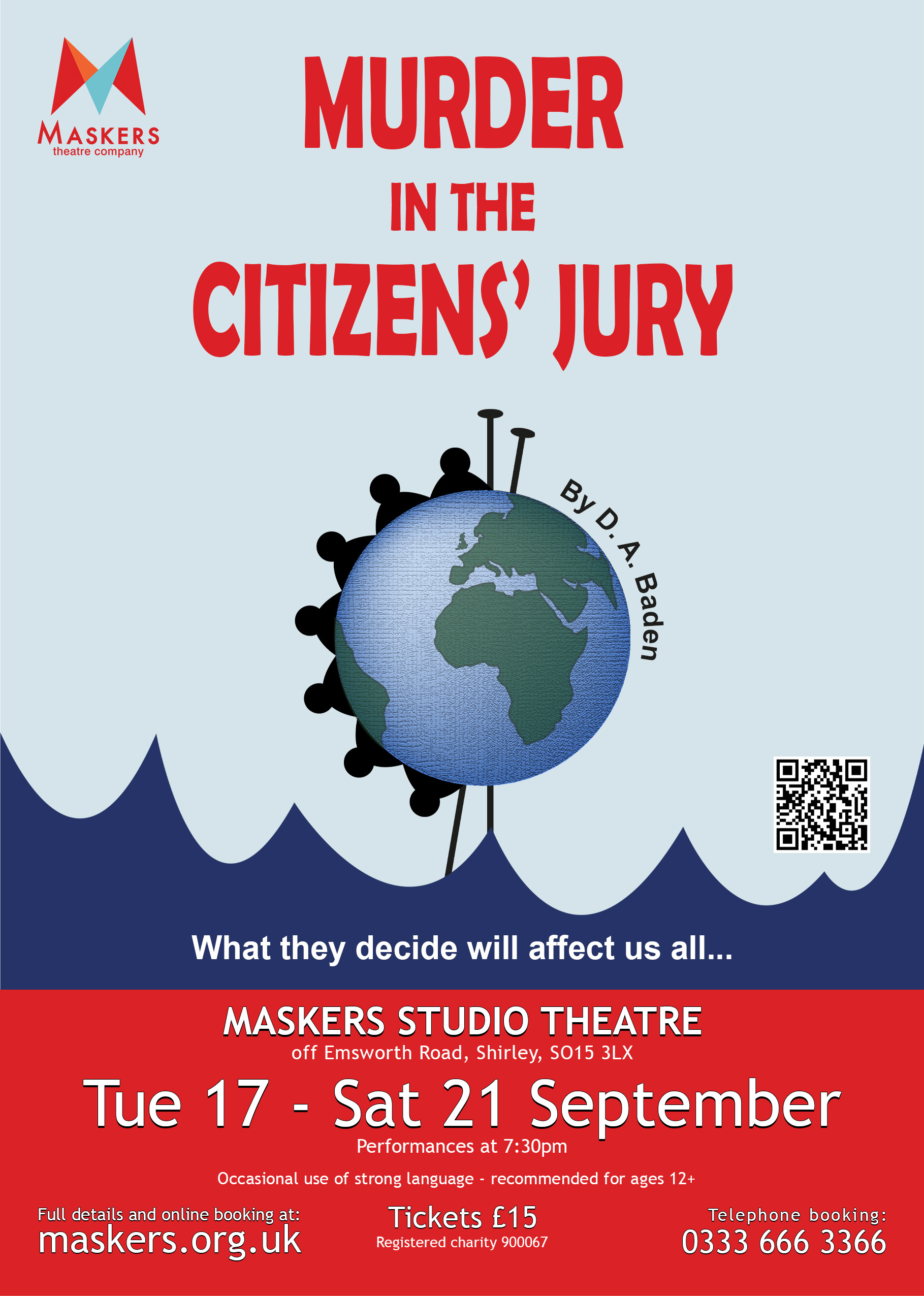
Murder in the Citizen’s Jury is adapted from a script that won the 2024 Writing Climate Pitchfest
This project is part-funded by the funded by the British Academy Shape Involve and Engage Fund. It explores one of the most pressing questions of our time: what do we do when our current systems are driving humanity to extinction?
Drawing upon the tradition of ‘theatre-in -education’, the objective is to use the play to raise awareness of climate solutions and citizen’s assemblies. The audience are encouraged to share their opinions using their programme or a voting app. Audience participation is voluntary. Anonymised results from audience votes may be used as part of a research paper or shared with interested parties. Back to top
Version 1. Full cast (9 mixed M & F) 120-minute whodunnit
Eight people in a Citizens’ Jury, discussing the most important challenge in the history of humanity – how to save ourselves from the looming climate crisis. Exciting new solutions are proposed, each with their own champions and detractors. What they decide will affect us all. But they all have their own issues to deal with, and one of them has a hidden agenda. Who is the assassin and who are they there to kill?
Afterwards the audience are invited to choose (if they wish) their favourite climate solution, and to help the Director of of Public Prosecutions with the moral dilemma of whether to prosecute the killer. If he does, it will shut down Citizens’ Juries which he believes are the magic bullet to help us make decisions that will avert climate change.
First performance of full 90 minute whodunnit version 17th – 22nd September 2024 7.30pm. Maskers Studio Theatre, off Emsworth Road, Shirley. SO15 3LX. Tickets £15. On Friday 20th and Sunday 22nd there was a Q&A following the performance. See our 2 min promo video or 4-min video below with more detail.
Voting results from stage play
We were intrigued to note that the audience voted differently on the dilemma each night. Overall it was quite equal, with 202 voting to prosecute and 207 voting not to prosecute. See voting results here.
The audience were also encouraged to say which climate policy they’d vote for, and their views on citizens’ assemblies. You can see a summary of the data here. Back-to-top
Reviews
We’ve had great reviews of the stage play already, see Review: Murder in the Citizens’ Jury, Maskers Theatre Company – In-Common – Southampton and Murder In The Citizen’s Jury – Scene One+ (sceneoneplus.com).
Below are two script reviews
Sky Blue Theatre review
‘Murder in the Citizen’s Jury’ is a really interesting play that uses the murder mystery genre and its tropes to explore the climate crisis and the impact potential countermeasures could have. I really enjoyed reading it.
I found the core concept of this play terrific! The idea of setting a murder mystery in a citizen’s jury is a great way to bring attention to citizen’s juries as a concept, while keeping the play fresh and exciting with a clear story structure that we’re already familiar with. I think there’s a real opportunity to attract an audience that wouldn’t ordinarily be interested in going to watch a “climate play,” but may be interested in seeing a murder mystery, allowing you to reach these people with a really important message. It’s also a really interesting and unique setting for a murder mystery that brings together many people who don’t necessarily have anything to do with each other and ensures that they, and only they, can all be suspects.
Often when I’m appraising scripts with audience interaction I tend to be a bit wary, but the audience interaction that occurs at the end of this play is refreshingly well thought through and has a real purpose, making the point that it is down to everyone to help fight the climate crisis. As this play is so political, the choice to make the audience active participants helps with the aim to provoke a sense of action within the audience. The amount of audience interaction you have at the moment is well balanced and doesn’t overstay its welcome.
I really enjoyed how this play was able to bring aspects of climate change to the forefront and grab the audience’s attention without ever seeming dry or out of place. It’s also realistic about many of these proposals, such as acknowledging that the Library of Things may have poor uptake and its potential climate savings are poor. It’s a balanced portrayal that is sure to take into account people’s concerns and ultimately has a hopeful message to conclude on.
You have a really interesting and varied cast of characters here, all of whom have lives that have been directly affected by the climate crisis in one way or another. We can clearly understand where each of them is coming from in their arguments from each of their backgrounds. Every character’s viewpoints are treated with respect and none of them are dismissed by turning their viewpoints into a satirical stereotype.
Review 2
The play has got wonderful, eclectic characters that the audience can see themselves reflected in just enough to empathise with, but enough “caricature” to be able to criticise, and thus question one’s own actions and motives. The educational ambition of the play blends very well, and the declarative nature of the play medium allows for effective monologues that educate the audience. As a person with no ecological knowledge, it was incredibly interesting to learn about these topics in an engaging manner. Paired with great moments of comedy (the writer has a knack for comedy), the murder mystery element is paced well through the ingenious spotlight switches in between the interrogation and the event, and it will be entertaining for the director to make this work. Overall, the story is great – incredibly engaging, memorable, and well written. It makes a wonderful murder mystery that stays with you. Back-to-top
Thanks to Naomi Elster who adapted the short story ‘The Assassin’ I wrote into stage format.
Putting on the play
We are happy to hear from theatre companies, schools or colleges who would like to perform the play. We are currently offering it royalty free and have a full cast of nine, 120-minute whodunit version, dramatic monologue version and one hour version.
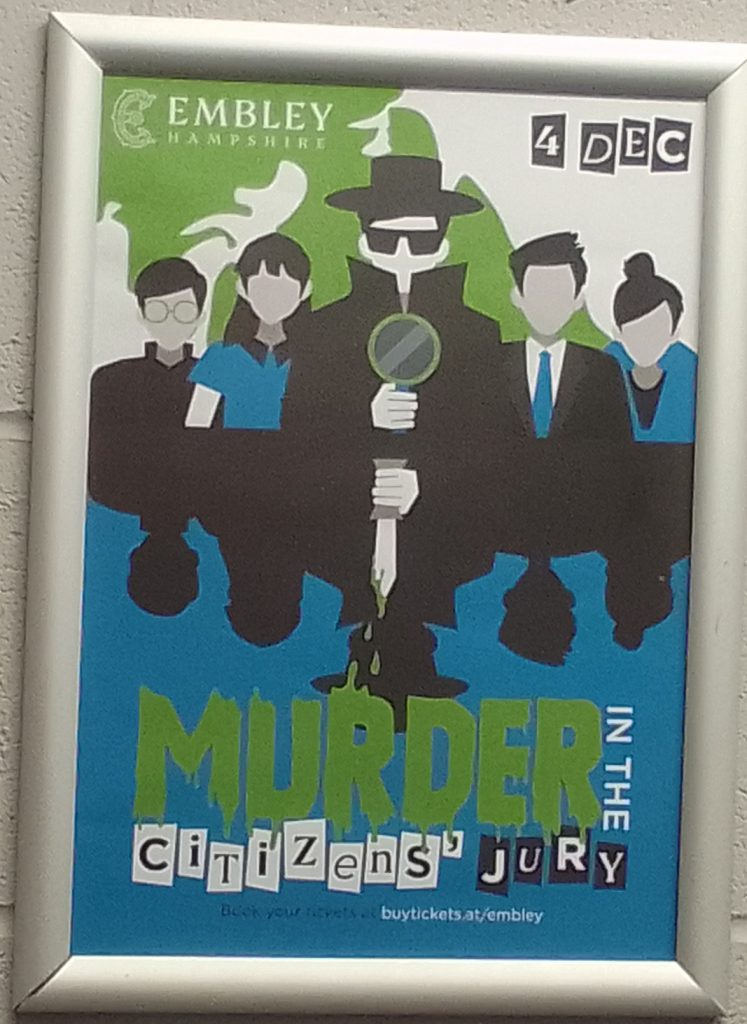
We’d like to hear from theatre companies, schools or colleges who would like to perform the play. We are currently offering it royalty free and have a full cast of nine, 120-minute whodunit version, dramatic monologue version and one hour version. For example, Embley School in Hampshire staged a one- hour version with great reviews from the audience: see sample below:
Loved it. Great idea with the voting for the audience.
Great show. Both entertaining + educational
I loved it. It was amazing
Perfect! We need more of this.
Enjoyed all of it – set excellent, loved the backdrop & a great choice of play.
Please get in touch if interested. Back-to-top
Version 2: Short version: Dramatic Monologue
This is a one-man play of 30 minutes written by Denise Baden, from the University of Southampton. It explores the dilemma of the Director of Public Prosecutions. If he prosecutes, he will alienate his family, and it will mean the end for citizens’ assemblies – a form of direct democracy which many believe could be the silver bullet to avert a climate crisis.
First performance by Jack Klaff, was at University of Southampton 11th Nov 2023 3pm-4pm. Free with Q&A.
The second performance by Jack Klaff (+ Q&A) was Saturday 20th April 2024 at 7.30pm at Southampton Central Library.
Live-streamed from https://www.youtube.com/@greenstoriesuk/streams.
Below is a short 7 minute film with extracts of the play and Q&A which was funded by the British Academy SHAPE Involve and Engage Award.
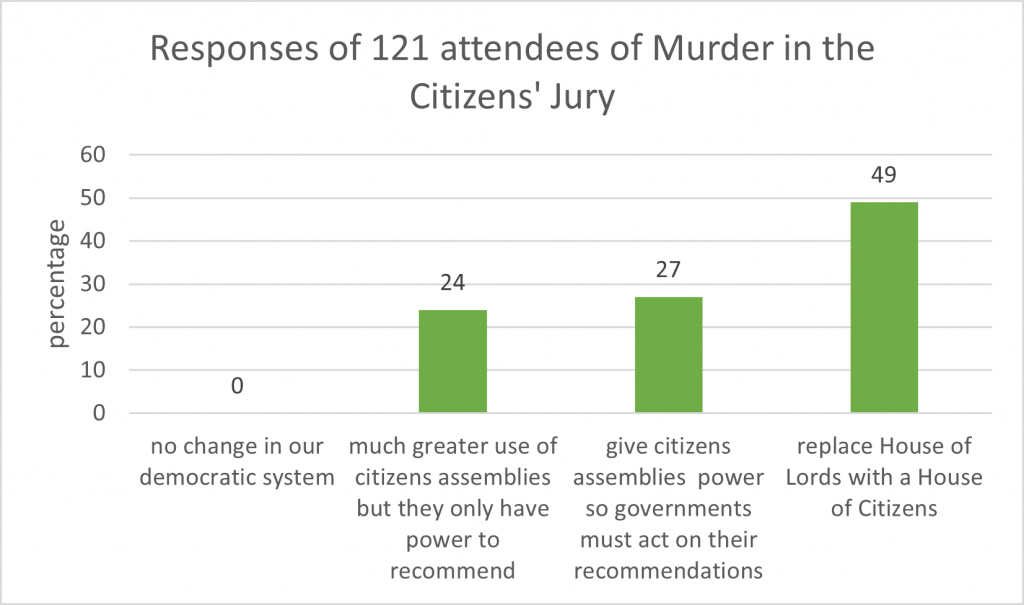
The one-man play follows the dilemma of the Director of Public Prosecutions when a murder happens in a citizen’s assembly on climate. We use the drama to raise awareness of citizens assemblies. Afterwards we invite the audience to share their views via their programme or via a voting app. The results are here.
As a warm up to get the audience used to the idea of voting and to test out the voting apps, the play begins with a question: would you shoot Hitler if you could get away with it? For those that are interested, here are the results.
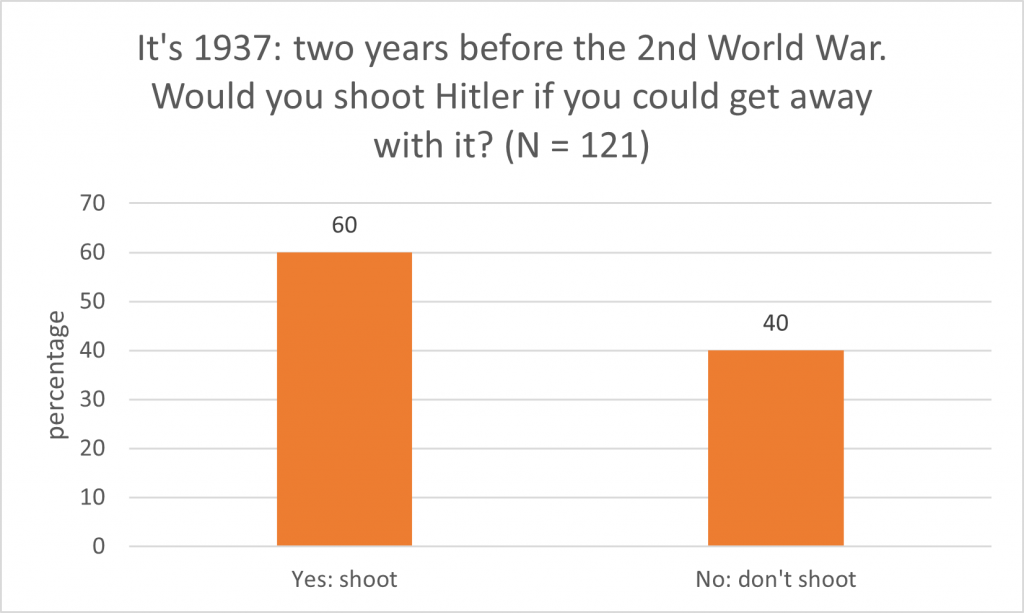
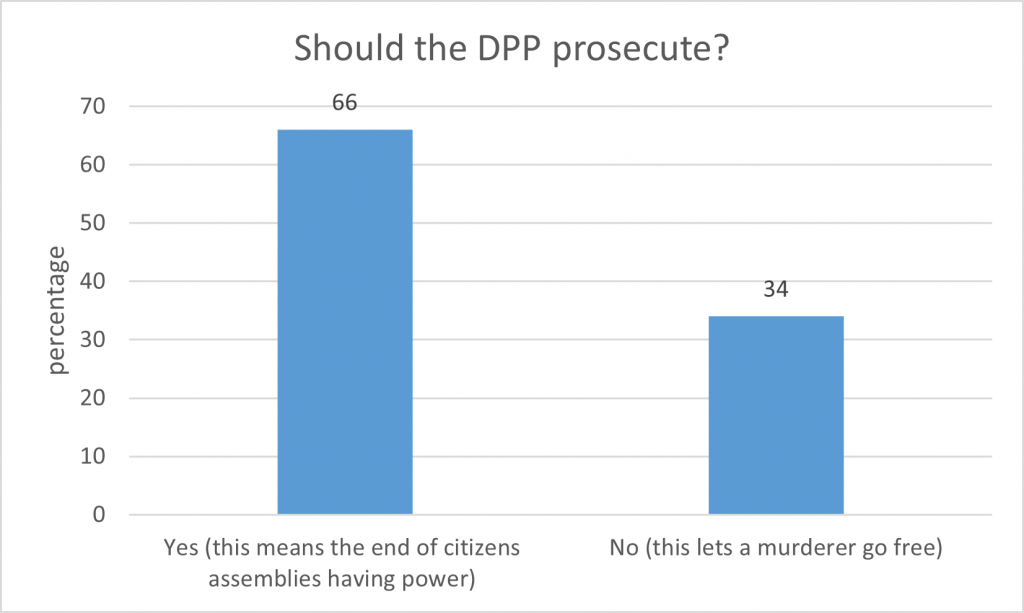
If the Director of Public Prosecutions prosecutes, this could mean the end for citizens’ assemblies having power. In the story they are in a trial period. If all goes well, a House of Citizens will replace the House of Lords. Many think this form of participative democracy could be the silver bullet to avert a climate crisis. You can see what audiences voted here.
You can find out more about citizens’ assemblies and how to campaign for them here.
Feedback from the audience
“Fabulous”
“Think it’s a great idea! Our short term government has very little foresight. Great play!”
“Had not heard of citizen assembly before today”
“Loved it!”
“It’s made me more interested in the idea of citizen’s juries”
“I wasn’t aware of citizen’s assemblies – will definitely follow this up. I was torn with the question of prosecute or not, shoot or not – as all actions have repercussions we’re not always prepared for”
“I learned a lot. A unique and fun way to spend a Saturday afternoon”
“Really thought provoking – the idea of constitutional reform as a means of addressing climate crisis is intriguing”
“Q&A was very interesting and performance dramatic and engaging”
“I like the play, brilliantly performed! The conflict between the following the law and doing the best for the people for me personally was very moving”
“Raised awareness perfectly”
“Very interesting and intimate”
Information on Citizens’ Assemblies
Citizens’ assemblies help to address the weaknesses of our current system. These are:
- Short electoral cycles means long-term existential issues are unaddressed.
- Many elected politicians are drawn from wealthy, upper classes and lack awareness of issues faced by those they represent.
- Politicians are constrained by powerful vested interests, media conglomerates, party factions and ideological party members.
- Population often vote on basis of misinformation rather than being informed by independent experts in the relevant field.
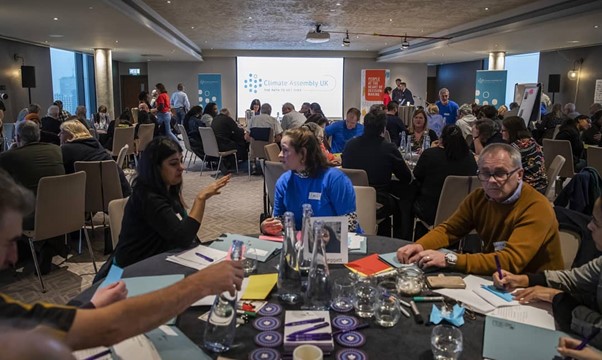
Information and photo adapted from https://www.sortitionfoundation.org/citizens_assembly Information below taken from Citizens’ Assembly | involve.org.uk
A citizens’ assembly is a group of people who are brought together to discuss an issue or issues and reach a conclusion about what they think should happen. The people who take part are chosen so they reflect the wider population – in terms of demographics (e.g. age, gender, ethnicity, social class) and sometimes relevant attitudes (e.g. preferences for a small or large state).
Citizens’ assemblies give members of the public the time and opportunity to learn about and discuss a topic, before reaching conclusions. Assembly participants are asked to make trade-offs and arrive at workable recommendations.
This method can be used most effectively when the goal is:
- Examining broad policy objectives/ horizon scanning to create new ideas and propose solutions;
- Assessing policy options to develop recommendations;
- Gaining insight from the public about the efficacy of existing practice.
Citizens’ assemblies have been used in the UK and other countries – including Australia, Canada and the United States – to tackle a range of complex issues. A citizens’ assembly in the Republic of Ireland – established by the Irish parliament – addressed a number of important legal and policy issues facing Irish society. These included equal marriage, abortion and the opportunities and challenges of an ageing population.
Strengths
- The process can be high profile and provide a good way of drawing attention to an issue
- Can bring out diverse perspectives on complex and contested problems
- Decision makers brought face-to-face with citizens or those with lived experience of an issue
- Learning phase and deliberation with peers can help participants to understand, change and develop their opinions;
- Offers policy makers an insight on public opinion on a contested issue based on the public having access to thorough and unbiased information and time for deliberation
Weaknesses
- Gaining a broadly representative group of people can be challenging and expensive
- The process for developing and planning an assembly is intensive and demanding on human and time resource
- Running a citizens’ assembly is a highly complex process requiring significant expertise
- There is a danger of being seen as a publicity exercise if not followed by real outcomes (applies if only have power to recommend)
- They are not effective when used to achieve a pre-conceived outcome; those commissioning them must be genuinely open to the public generating new ideas and solutions
A Novella: The Assassin
The play is also available as a novella: The Assassin. The audiobook will be available August 2025.
An extended version of the novella is the novel The Philosopher and the Assassin, expected Oct 2025
